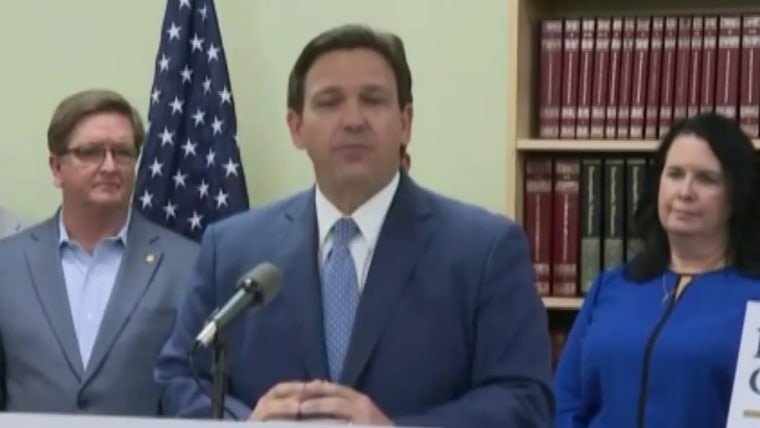Florida Gov. Ron DeSantis on Tuesday vetoed congressional maps drawn by the state's GOP-controlled state Legislature, arguing the maps violated the U.S. Constitution.
His argument is premised on the dubious claim — parroted by many conservatives — that a law protecting nonwhite candidates and voters from having their power diminished is unconstitutional.
The maps DeSantis rejected would have given Republicans outsize power in a state former President Donald Trump won by roughly 3 percentage points in 2020. Republicans would have an advantage in 18 of the state's 28 districts if those maps were approved.
But that wasn't enough for DeSantis.
The governor, who threatened to veto the maps for months unless they were drawn to his liking, took the rare step of proposing his own map in January, which featured a 20-8 split in favor of Republicans. That map would destroy two largely Black districts with seats held by Black Democrats, U.S. Reps. Val Demings and Al Lawson.
Critics were quick to point out his proposal would violate the Florida Constitution’s Fair Districts amendment, which outlaws districts drawn to deny minorities equal participation and representation in the political process.
But DeSantis and his right-wing cronies bizarrely argue that the law, which protects minority candidates and voters from racist power-grabs, violates a provision in the U.S. Constitution meant to protect minority candidates and voters from racist power grabs.
Seriously. He claimed on Tuesday that the Legislature’s maps ran afoul of the 14th Amendment's Equal Protection Clause.
“In their, I guess, understandable zeal to try to comply with what they believe the Florida Constitution required, they forgot to make sure what they were doing complied with the 14th Amendment of the U.S. Constitution,” DeSantis said at a news conference.
Contrary to his claims, there isn’t any real confusion about what Florida law or the U.S. Constitution permits when it comes to this issue.
The Florida Constitution explicitly bars racist gerrymanders like the one DeSantis is calling for. And in 2017, the Supreme Court affirmed the right of state legislatures to draw districts to protect so-called minority voters if the effort is narrowly tailored and serves a compelling interest.
All of this proves DeSantis’ gerrymandering push is purely political and in no way focused on legality. Notably, it aligns with conservative claims that antiracist policies — in everything from farming to education to voting — are racist.
Also, with Desantis a potential 2024 presidential candidate, having Florida’s congressional caucus packed with Republicans would serve him well if he were elected.
And on top of that, he's clearly angling for a high-profile legal fight. Today's Supreme Court is decidedly more conservative than it was when it handed down that 2017 ruling, meaning there’s a possibility the revanchist court Trump worked to create reneges on the previous ruling and supports DeSantis’ racist, anti-democratic vision.
